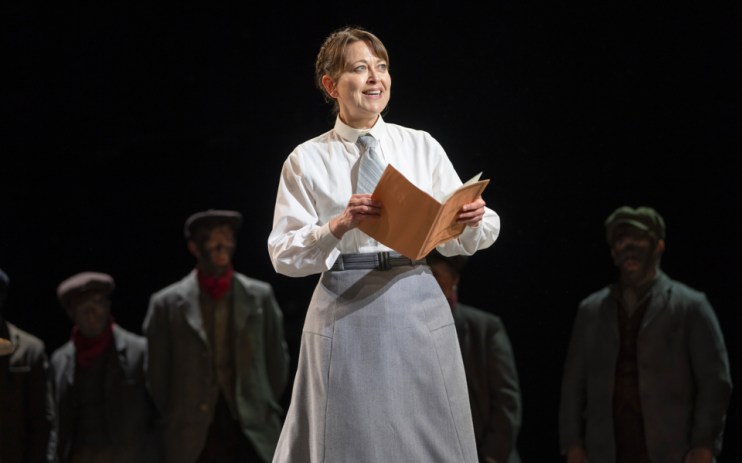The Corn is Green review: A twee revival at the National Theatre

The National Theatre’s revival of Welsh actor and playwright Emlyn Williams’ The Corn is Green – the first major production in London since the mid-80s – is a comforting, middle-brow ITV period drama plopped onto the stage.
The beats of this semi-autobiographical tale of an impoverished boy propelled from the pits to the cultural elite by the intervention of an inspirational teacher are almost cliché. They are paralleled in better remembered works, like My Fair Lady and Billy Elliot, but The Corn is Green was a considerable hit in its time. Its West End debut, in 1938, packed in the crowds until the declaration of war with Germany, and it had two runs on Broadway in the early ’40s. It was even made into a film starring the formidable Bette Davis, and some truly atrocious “Welsh” accents.
Set in the early years of the 20th century, the play begins when the happily unmarried Miss Moffat inherits a North Walian estate from her uncle. She blows in from London to disrupt the established order of the valleys with her intention to establish a school for the betterment of the local children, who are all down the coal mines by the age of 10.
Stalwart of British TV drama Nicola Walker (Spooks, Last Tango in Halifax, The Split) brings big jolly hockey sticks energy to the role of Moffat, the pioneering educator with a missionary zeal to enlighten the local minor miners. Her progressive politics jostle with religion, class and tradition as she bends the community to her will. Some of the most entertaining scenes are those in which Moffat squares off with the local squire, played by a gamely fusty Rufus Wright. He is the embodiment of the wealthy, know-nothing landed gentry, whose influence would ebb as Britain slowly moved towards becoming a more meritocratic society.
Emlyn Williams’ fictionalised analogue in the play is the gifted orphan pit-worker Morgan Evans (Iwan Davies, in an impressive professional theatre debut). He is the coal-dust covered Cinderella to Moffat’s Fairy Godmother. Having seen his potential, she makes him her pet project, and the audience knows that his elevation to Oxbridge is ensured. But departing from the details of his own life, Williams inserts a scandalous dalliance with Moffat’s housekeeper’s wayward daughter, which throws unnecessary melodrama into an otherwise twee narrative, and momentarily injects a phantom peril that nobody in the audience really believes could derail the young man’s promising future.
In a postmodern twist, this production puts the figure of the playwright himself onstage, and in the first half of the play, sets are eschewed in favour of Emlyn Williams’ spoken stage directions, and a series of almost cartoonish sound effects. Williams (Gareth David-Lloyd), can be seen between scenes agonising at the typewriter, as he tries to bring the story together, and hovering around the stage as events unfold, unseen by the other characters. After the intermission, the play becomes less episodic, less reflective of his own life-experience, and he appears less anguished. There is a fully realised set, and stage directions are no longer given aloud, but Williams – still a sort of ghostly figure – appears to intervene, whispering to characters to make rewrites on the fly.
The production makes good use of the Welsh language, and a Welsh male voice choir, and there is an emotional force to the whole affair that will pull along even the more cynical members of the audience. But in the end, fine performances and fourth wall-breaking innovation cannot overcome the stale source material. The Corn is Green is the theatrical equivalent of a nice, warm, well-worn pair of tweed slippers.